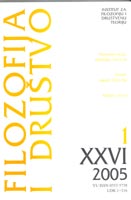Društvene osnove i političke upotrebe narodskih priča o srpskom nejedinstvu
The Social Origins and Political Uses of Popular Narratives on Serbian Disunity
Author(s): Slobodan NaumovićSubject(s): Anthropology
Published by: Institut za filozofiju i društvenu teoriju
Keywords: popular narratives on Serbian disunity; political instrumentalisation of popular narratives; rethorical strategies; quasi-ethnic identity splits; political and party cleavages; manipulative politics;
Summary/Abstract: The text offers an examination of socio-political bases, modes of functioning, and of the consequences of political instrumentalisation of popular narratives on Serbian disunity. The first section of the paper deals with what is being expressed and what is being done socially when narratives on Serbian disunity are invoked in everyday discourses. The next section investigates what political actors attempt to do by referring in their addresses to popular narratives on Serbian disunity, by publicly replicating them, or by basing their speeches on key words of those narratives. The narratives on Serbian disunity are then related to their historical and social contexts, and to various forms of identity politics with which they share common traits. The nineteenth century wars over political and cultural identity, intensified by the struggle between contesting claims to political authority, further channelled by the development of party politics in Serbia and radicalised by conflicts of interest and ideology together provided the initial reasons for the apparition of modern discourses on Serbian disunity and disaccord. Next, addressed are the unintended consequences of popular and political “disunitology”. Because of unintentionally solidifying or misinterpreting really existing social problems (in the case of some popular narratives on disunity), or because of intentionally exploiting popular perceptions of such problems (in the case of most political meta-narratives), the constructive potential related to existing social conflicts and splits can be completely wasted. What results is a deep feeling of frustration, and the diminishing of popular trust in the political elites and the political process in general. The contemporary hyper-production of narratives on disunity and disaccord in Serbia seems to be directly related to the incapacity of the party system, and of the political system in general, to responsibly address, and eventually resolve historical and contemporary clashes of interest and identity-splits. If this vicious circle in which the consequences of social realities are turned into their causes is to be prevented, conflicts of interest must be discursively disassociated from ideological conflicts, as well as from identity-based conflicts, and all of them have to be disentangled from popular narratives on splits and disunity. Most important of all, the practice of political instrumentalisation of popular narratives on disunity and disaccord has to be gradually abandoned.
Journal: Filozofija i društvo
- Issue Year: 2005
- Issue No: 26
- Page Range: 65-105
- Page Count: 41
- Language: English

